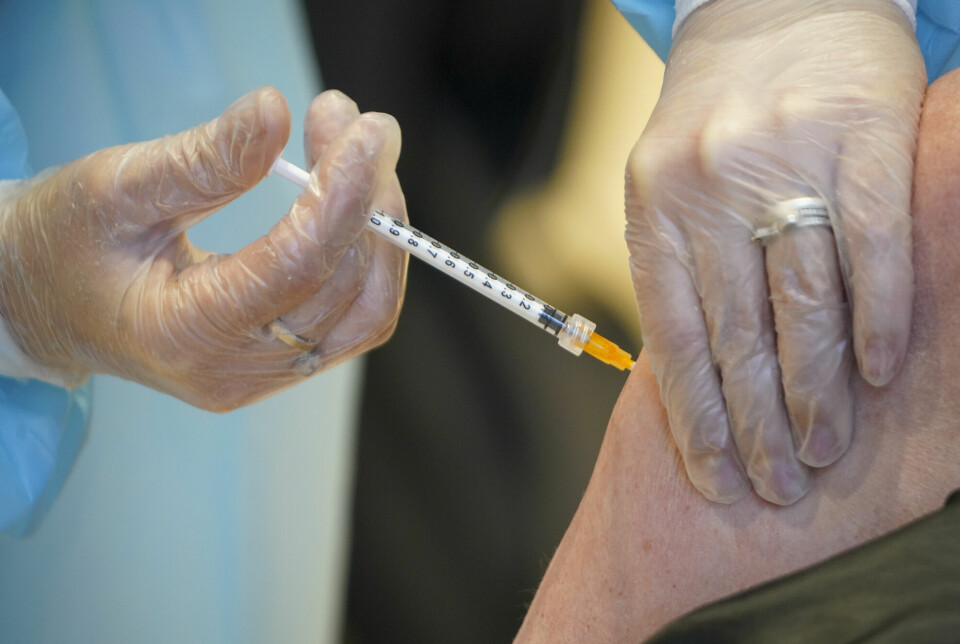
Here’s what we now know about side effects of the Covid-19 vaccine
Billions of doses of Covid-19 vaccines have been injected into the arms of a large percentage of the world's population. Now researchers are doing their utmost to identify possible side effects.
Absolutely all vaccines carry a certain risk of serious side effects. This is also true for the Covid-19 vaccine.
Many researchers in many countries are now working to identify side effects, says Gunnveig Grødeland, a vaccine researcher at the University of Oslo and Oslo University Hospital.
Some of the largest studies are ongoing in the USA, where millions of vaccinated people are being followed up. But Norway and the Nordic countries have also contributed to this research.
Crystal clear
“What is crystal clear from all this data is that it is very rare for there to be serious side effects from the Covid-19 vaccine,” Grødeland said.
“But there are some rare and serious side effects. This is particularly true for myocarditis,” she added.
This is an inflammation of the heart muscle that can damage the heart.
According to two British cardiologists who recently wrote a post in The Conversation, severe myocarditis after vaccination for Covid-19 is extremely rare.
Around the world, as many as four deaths have been reported, they wrote.
Grødeland emphasizes that even though the mortality rate is very low, it would be quite dramatic for an otherwise healthy person to have heart problems after vaccination.
“Although myocarditis in most cases goes away quickly, it could have after-effects in some people,” Grødeland said.

Discovered that young men are more vulnerable
Nordic researchers have found that young men are more susceptible to heart muscle inflammation after the second dose of mRNA vaccines.
Early findings from this study led the Norwegian Institute of Public Health in October 2021 to encourage men under 30 to choose the Pfizer/BioNTech vaccine over Moderna.
The study is a cohort study that included more than 23 million inhabitants in Norway, Denmark, Finland and Sweden.
In total, the researchers found 1,077 cases of myocarditis among vaccinated and unvaccinated in the study period from 27 December 2020 to 5 October 2021.
All these countries have very good health records, which made it possible to identify this trend so quickly.
Discovered blood clots
When the Covid-19 vaccine arrived, it was given conditional approval.
This meant that the benefit of quick access was considered to be greater than the risk associated with waiting for data on efficacy and side effects.
This also obliged the countries that adopted the vaccine to carry out a more comprehensive assessment of rare side effects.
Norway has followed up on this very thoroughly, Grødeland said.
This follow-up led Norway and Denmark to report in a study that there was an excess of rare but serious blood clots from the AstraZeneca vaccine.
“These side effects were so rare that you could run clinical trials in a population for 20 years and never discover them,” Grødeland said.
The discovery led the Norwegian Institute of Public Health to decide in March 2021 to put vaccination with the AstraZeneca vaccine on hold in Norway.
Menstrual changes
There have been a good number of reports, including to the Norwegian Medicines Agency, about menstrual changes after Covid-19 vaccination.
Sarvani Mahalingam and Gunnveig Grødeland have written about this issue in the Journal of the Norwegian Medical Association (in Norwegian).
Many studies are looking at this exact issue right now, says senior researcher Sven Even Borgos. He studies vaccines at SINTEF, Scandinavia’s largest independent research institute.
“Currently, the literature is very sparse. In general, it can be said that researchers haven’t seen substantial effects, but they have found a small effect on the length of the menstrual cycle,” Borgos said.
Also applies to those who were infected
In October 2022, the European Medicines Agency (EMA) recommended adding heavy menstrual bleeding as a possible side effect of the mRNA vaccine.
A large study that summarized many other studies concluded that it’s possible the vaccine might affect menstruation in women. This was the case not only for those who were vaccinated with an mRNA vaccine, but all Covid-19 vaccines.
“But it is interesting that some of those who have had Covid-19 also report changes in their cycles and heavier bleeding,” Borgos said.
The same has been reported for other viral diseases, not just Covid-19, he said, including in women who have had the Ebola virus and recovered afterwards. Some of these women reported that their periods have disappeared, others that they become irregular.
“This may be the result of the body reallocating energy and resources. The same applies to someone who is exposed to severe stress,” he said.

Not included in the trials
Not only is the menstrual cycle affected by infection, but the severity of the infection can be affected by your hormone levels and where you are in your menstrual cycle, according to the researchers behind the study.
Borgos finds it thought-provoking that changes in the menstrual cycle were not included among possible side effects when Pfizer/BioNTech and Moderna tested vaccines in the original clinical studies.
“This is perhaps a symptom of a problem in medicine: The complexity of female physiology has not been taken into account when medicines are developed,” Borgos said.
Many had headaches and fevers
In addition to the rare side effects such as heart muscle inflammation and blood clots, and the slightly more common ones such as changes in the menstrual cycle, many people experienced physical discomfort after vaccination.
Sixty per cent of those who have received the second dose of the vaccine have experienced physical discomfort such as fever and headache, says Borgos.
One study has taken a closer look at these side effects. The researchers behind this study think it is likely that the side effects are linked to what is called the interferon-I response.
“This is what the body initiates when we are infected with a viral disease. It’s the early process that activates your immune system so it can deal with the disease,” Borgos said.
Side effect or effect?
If this is correct, it is very interesting, Borgos said.
“This is a good fit with the fact that the usual side effects after vaccines have been stronger for younger people than older people and for women than men,” he said.
It’s not certain that these problems can be considered a side effect, although they are unpleasant. It can be argued that these symptoms are actually a sign that the vaccine is working as it should.
“More research needs to be done on this,” Borgos said.
Important to report
The Norwegian Medicines Agency is the public body that collects reports of side effects.
But the fact that a side effect is reported does not necessarily mean that there is a causal connection between the suspected side effect and the vaccine.
The numbers reported as possible side effects are far higher than the number of actual side effects.
They must therefore be taken with a large grain of salt, Grødeland said.
“Yet they are very important. This way we reduce the likelihood of missing something that should have been caught,” she says.
The vaccine or the disease?
There are many challenges involved in studying vaccine side effects, Grødeland said.
An obvious problem is that the same possible side effects, such as inflammation of the heart muscle, can occur both after vaccination and after being infected by the virus.
The research today shows varying figures for how many people are affected by this side effect, says Grødeland.
Anything from one per 10,000 to one per 20,000 of vaccinated healthy young people could develop this type of heart inflammation.
“But it is also a fact that if you are not vaccinated and get Covid-19, you have a seven times higher risk of getting this disease than if you are vaccinated for the same age group,” she said.
A complicated picture
This complicates the picture, Grødeland said.
She believes there is a moral difference between a healthy person becoming ill from a vaccine, versus being infected and made ill from a random virus.
“But there is a difference in how we weight what risk is acceptable for vaccination. There will be different answers, depending on who you ask. I believe a rule of thumb must be that there must be a clearly lower risk associated with vaccination than with infection from the virus,” she said.
Looking for answers in large populations
There are several ways to study side effects of a vaccine.
Several vaccine studies currently underway, including one from Italy that forskning.no recently wrote about (in Norwegian), have looked at hospitalizations in large populations.
These studies have investigated how often hospitalized patients have developed serious diseases that are known to be linked to the vaccine, such as inflammation of the heart muscle.
They then compare the vaccinated and unvaccinated. They also compare people who have been infected by the virus with those who have not been infected, to see if it is the vaccine or the virus that has caused the disease.
Not well designed
The study from Italy looked at side effects in an entire region, for a total of 316,000 people. They again divided these into groups of between 15,000 and 50,000 people.
This may sound impressive. But Grødeland nevertheless believes that the research design for the Italian study was not good enough to study rare side effects.
“They don't have enough people included to be able to capture those with really rare side effects,” she says.
Apples and oranges
A further weakness is that the researchers combined groups of people aged six and over, without further differentiation.
“If there were to be rare side effects in this population, this combination would be able to hide it,” Grødeland said.
She said it is very important to compare relevant groups with each other when studying side effects.
“When there is such a large age difference between the various groups, it’s like comparing apples and oranges,” she said.
The study from Italy shows that the vaccine has a crystal clear effect against mortality among the oldest, Grødeland believes.
“But when it comes to excluding serious side effects from the vaccine, the study is not good enough,” she said.
Are there more side effects?
Many billions of doses of Covid-19 vaccines have now been administered worldwide. This provides researchers enormous amounts of data to investigate side effects.
In principle, several side effects could crop up. But what speaks against new side effects appearing are the enormous numbers of vaccines that have already been administered, Borgos said.
“It doesn’t seem likely that major side effects that we have not heard anything about yet will appear now,” he said.
Translated by Nancy Bazilchuk
———
Read the Norwegian version of this article at forskning.no







































